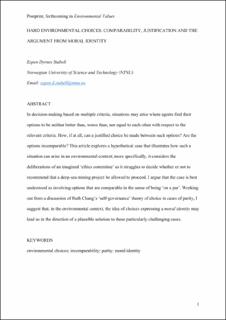Hard Environmental Choices: Comparability, Justification, and the Argument from Moral Identity
Journal article, Peer reviewed
Accepted version
Permanent lenke
http://hdl.handle.net/11250/2631297Utgivelsesdato
2019Metadata
Vis full innførselSamlinger
Originalversjon
10.3197/096327119X15678473651009Sammendrag
In decision-making based on multiple criteria, situations may arise where agents find their options to be neither better than, worse than, or equal to each other with respect to the relevant criteria. How, if at all, can a justified choice be made between such options? Are the options incomparable? Exploring a hypothetical case illustrating how this situation can arise in the environmental context –that of an ethics committee which is to make a choice between recommending or not that a deep-sea mining project is allowed to proceed –this paper argues that the case is best understood as involving options that are comparable in the sense of being ‘on a par’. On the background of a critical discussion of Ruth Chang’s ‘self-governance’ theory of choice in cases of parity, it is suggested that in the environmental context, the idea of choices expressing a ‘moral identity’–reflected in statements about what kind of people or society we ideally think we should be –may lead us in the direction of a plausible solution to these hard cases.
